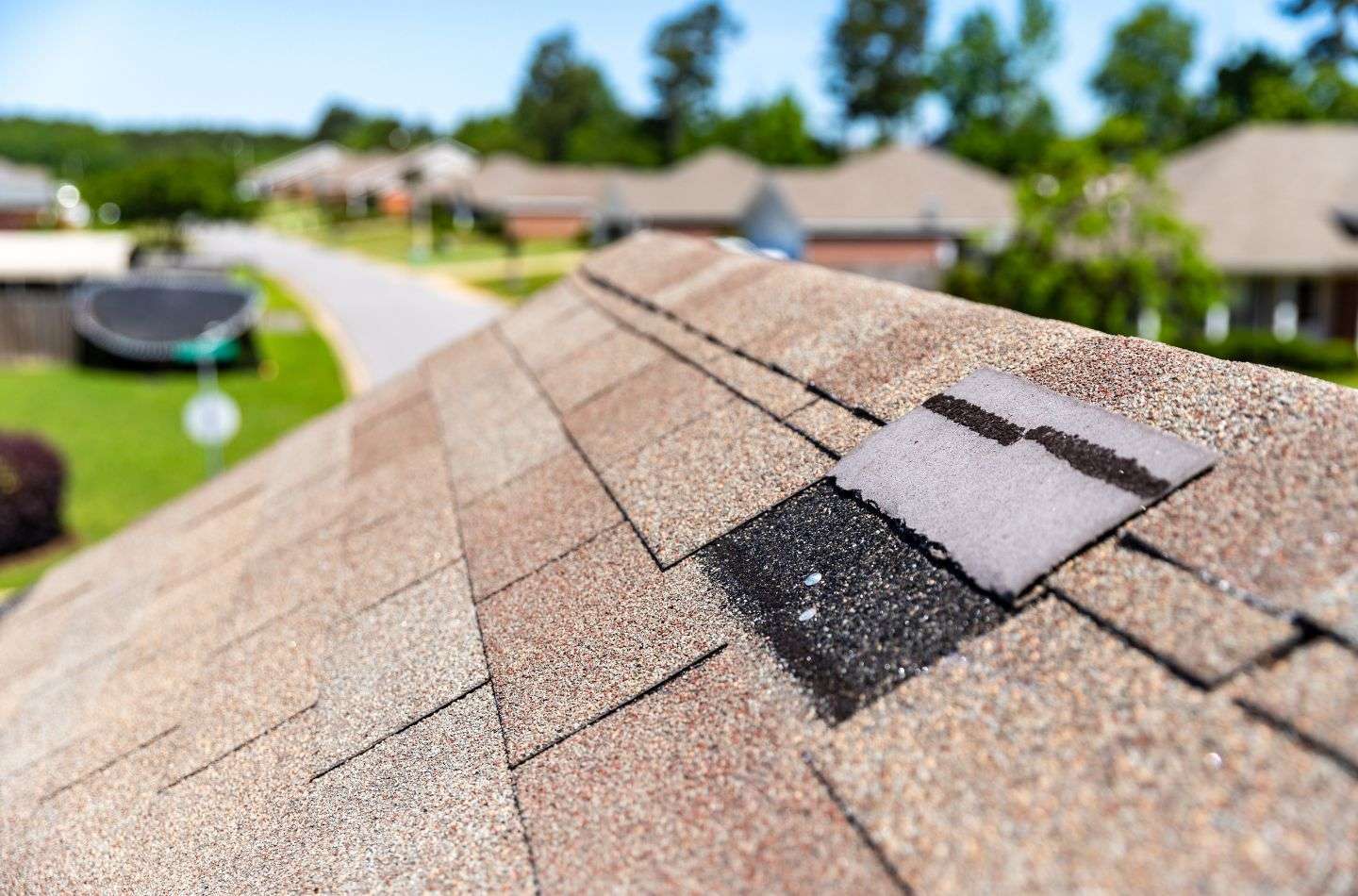ROOFING INSURANCE FAQ
It can be overwhelming when your roof is damaged by a storm. Dealing with insurance adjusters and roofers can increase that stress.
Below are answers to our most our Roofing Insurance FAQ (Frenquently Asked Questions) including how to deal with insurance after a storm.

TABLE OF CONTENTS:
- What do insurance companies typically cover for roofing?
- What do they not cover?
- What are my options if the Insurance Adjuster under evaluates the work needed?
- Can I get my deductible waived on an insurance claim for a new roof?
- Can the roofing company pay my deductible as part of the overall cost?
- Should I shop for the cheapest price if insurance is replacing it so I can pocket some of the money?
- What is the impact of filing a claim?
- What is the difference between a RCV and a ACV roof policy? Why should I care?
- Can insurance tell me what contractor to use for my roof replacement?
- What help and actions should I expect from a roofer in the process?
WHAT DO INSURANCE COMPANIES TYPICALLY COVER FOR ROOFING?
Insurance often only covers storm damage. This typically includes wind damage, hail damage, fire damage, ice damage, lightning damage, and fallen tree damage. Some policies will cover some of these items but not others. Most roofing insurance companies will only cover a replacement if there are multiple damaged shingles on multiple faces and a repair is not a viable option. If the roof cannot be repaired due to it being too brittle or because the material on the roof can no longer be purchased, insurance may cover a full replacement with less damage.
WHAT DO THEY NOT COVER?
Most roofing insurance policies do not have coverage for wear, tear, or bad installations. They will also not cover any damage that occurred before the policy was active or after it had expired. To avoid surprises when filing a claim, be sure to keep up with your policy’s status and updates.
WHAT ARE MY OPTIONS IF THE INSURANCE ADJUSTER UNDER EVALUATES THE WORK NEEDED?
It is a common insurance adjuster tactic is to call for a repair that’s under the value of your deductible, which would make going through insurance pointless. At this point, your options are limited but may include:
- Paying for the repair out of pocket.
- Seeing if the roofer will provide a bid to compare the repair cost against the insurance deductible. If the repair costs more than the deductible, then part of the repairs may be covered by cost assistance from the insurance company.
- Attempting a repair, and proving the roof cannot be repaired due to failure of a brittle test.
- In states that have “matching laws” proving that you cannot match the rest of the roof with the “same quality, color, or size” forcing them to pay for a full replacement.
CAN I GET MY DEDUCTIBLE WAIVED ON AN INSURANCE CLAIM FOR A NEW ROOF?
Unfortunately, no.
A deductible is part of the binding contract between you and your roofing insurance provider. It’s no different than paying your deductible when you go to the doctor’s office. Not paying your deductible is considered insurance fraud and is a federal offense that can lead to heavy fines, being dropped by your insurance, and jail time.
CAN THE ROOFING COMPANY PAY MY DEDUCTIBLE AS PART OF THE OVERALL COST?
Again, no. The deductible is how much the homeowner must pay out of pocket before the insurance company will start paying for repairs or replacements. It is illegal for a roofing company to “pay the homeowner’s deductible” so don’t ask the roofer for this. The deductible is a small price to pay for a new roof that will typically cost 10 times or more than the deductible. A good roofing company can often finance this cost if that will help.
SHOULD I SHOP FOR THE CHEAPEST PRICE IF ROOFING INSURANCE IS REPLACING IT SO I CAN POCKET SOME OF THE MONEY?
Insurance providers have taken drastic action to battle insurance fraud, and consequently, the pay-out procedure has been substantially altered, making it illogical today.
No matter the amount of your quote or the quality of the roof you receive, you are still required to pay your deductible. Therefore, a lower-cost option will cost you the same as a higher-quality one.
Two, insurance companies nationwide rely on the third-party program Xactimate to calculate exact payouts for roof replacements when adjusting insurance claims. Xactimate is a non-biased company that creates region-specific pricing including labor, materials, and reasonable profit on every possible item/service that’s possibly involved in the roof replacement process. Now if Xactimate is listing fair market pricing for all of these line items, how would a contractor be able to charge less (committing fraud also) to save you money? It’s not charity, they have to make up that money somewhere. More often than not, it’s achieved through taking shortcuts on quality materials, omitting essential details in the project scope, re-using broken components, and utilizing untrained or uninsured workers.
It may be tempting to opt for a seemingly cheaper option, but these illegal strategies could lead to more problems later on. Consider this analogy: if you had the choice between an old Pinto and a brand new BMW, both with only $500 deductibles – which would you choose? Any sensible person would select a better car from a reliable source. The same concept should apply when selecting your roofer; in either case, pay is equivalent regardless of quality or quantity. Always go with superior quality!
WHAT IS THE IMPACT OF FILING A CLAIM?
The key to any insurance is only filing claims when you have a real need that is covered by your policy. If you file too many claims or poor-quality ones, the insurance company will either raise rates or drop coverage altogether. That’s why it’s important to have a reputable licensed roofer inspect the roof before trying to file a claim.
WHAT IS THE DIFFERENCE BETWEEN A RCV AND A ACV ROOF POLICY? WHY SHOULD I CARE?
An RCV (Replacement Cost Value) policy covers the cost to replace the roof at today’s value with no depreciation lost. These are the best types of policies.
An ACV (Actual Cost Value) policy only pays out the cost of replacement minus the depreciation based on the current condition of the roof. In ACV policies you will often see “non-recoverable depreciation” written as a line item. This means the homeowner is not only out of the deductible but also has to pay the depreciation out of pocket. This can be a big surprise to the homeowner and makes the process much harder if you don’t have the money available to purchase a new roof.
Knowing the details of your policy before the insurance adjuster arrives will save you from any unwanted surprises.
CAN INSURANCE TELL ME WHAT CONTRACTOR TO USE FOR MY ROOF REPLACEMENT?
Never allow your insurance company to tell you which contractor to use; they only do this because it benefits them financially. They may try to convince you to pick an inexperienced contractor who is willing to work for less money, or insist that you use their recommended contractor. However, both of these situations create a conflict of interest and are illegal.
If your roofing insurance company attempts to do this or is trying to discredit the contractor that you trust and have chosen, you should file a complaint on your local state insurance commission website.
WHAT HELP AND ACTIONS SHOULD I EXPECT FROM A ROOFER IN THE PROCESS?
A contractor who is willing to be your advocate, take on most of the work, and communicate with insurance will save you time and hassle when getting your claim approved and restoration completed. Here are some specific examples of what a good roofing contractor should do:
- A good contractor should do a thorough inspection of your property before the adjuster comes out.
- They should be fluent with the third-party program that all insurance companies use to write their estimates (Xactimate) so they are comparing apples to apples with your adjuster for a smoother successful process.
- They should meet with your adjuster when they come to the house for your inspection.
- They should do most of the email and phone correspondence with your adjuster.
- They should be licensed and insured and have great ratings online.
There is a lot of work involved in this process so be fair and reward your contractor for going through it for you by using them to do the work if your roofing insurance approves it.
FINISHED WITH THE ROOFING INSURANCE FAQ AND STILL HAVE QUESTIONS? CONTACT ROOF MD TODAY!
A good roofer will help you every step of the way and have your best interests at heart. If you need more information about roofing insurance claims or storm damage, reach out to Roof MD today. Our knowledgeable professionals are happy to help! We’ll give you all the details and guide you through the entire process of filing a claim. Schedule a FREE Roof Inspection and consultation below so we can get started!
ROOFING INSURANCE CLAIMS ARE difficult without help
After inspecting the roof, we found it was old and needed replacing. We collaborated with the homeowners’ insurance for a smooth replacement, given the storm and wind damage. The insurance asked for a brittle test to prove the shingles were too old, showing repairs wouldn’t help. Watch our team perform the brittle test efficiently.
Need help with your roof post-storm or with insurance claims? Roof MD specializes in storm damage and can liaise with your insurance.
